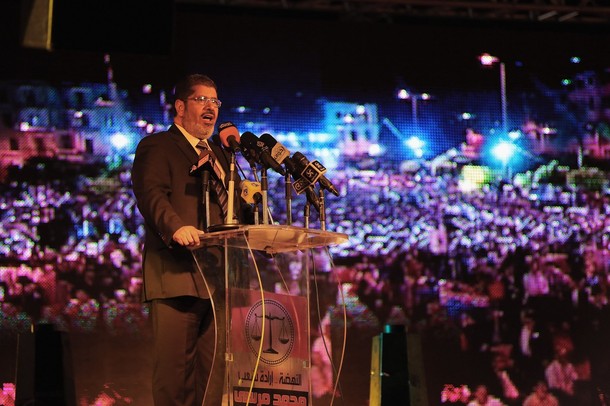
On June 1, liberal and leftist political forces released the final version of the "Document of the Pledge,” which they have presented to Mohamed Morsi and Ahmed Shafik in the hopes of obtaining commitments from the two candidates to advance the revolution’s objectives. Among the conditions included, the pledge would require the next president to:
· Protect a civil state and preserve the existing language of Article 2 in the new constitution, which establishes Sharia as the principal source of legislation, while respecting all interpretations made by the Supreme Constitutional Court.
· Work with Parliament to form a diverse and representative coalition government
· Announce the vice presidents and prime ministers before the run-off round on June 16-17
· Respect the separation of powers and the independence of the judiciary
· Support the formation of a constituent assembly representing all elements of Egyptian society, “especially the Copts, women, and youth”
· Safeguard the civilian nature of the state and exclude the armed forces from the political arena
· Promote policies to advance social justice and meet the basic needs of all citizens
The document was originally prepared by 15 political parties and movements belonging to the Nationalist Front, including the Egyptian Social Democratic Party, the liberal Ghad al-Thawra Party, the liberal Free Egyptians party and the Nasserist Party, and has since been endorsed by the leftist Tagammu’ Party. The drafting parties have not stated whether the candidates’ signatures on the pledge would be sufficient to win their support in the second round.
Ahmed Shafik, whose campaign has come under intense scrutiny for his former role as Mubarak’s last Prime Minister as well as for his military background, has announced his support for the pledge. His motivations in endorsing the document are obvious. Shafik’s ties to the former regime have become an even greater liability since the controversial acquittal of six Interior Ministry officials and relatively lenient 25-year sentence for Hosni Mubarak and former Interior Minister Habib al-Adly. Up against the Muslim Brotherhood’s formidable campaign apparatus, Shafik is desperate to ingratiate himself with the liberal, leftist and moderate Islamist voters that he so desperately needs to stand a chance against the Freedom and Justice Party’s candidate Mohamed Morsi. Shafik is also hoping to win the coveted endorsement of leftist candidate Hamdeen Sabbahi, who made a respectable third-place showing in the first round with a respectable 22 percent, a voting bloc that could make or break Shafik’s presidential bid.
Meanwhile, Mohamed Morsi’s reaction to the proposed pledge has been standoffish at best, and he has yet to announce his official position on the document.Although Morsi barely squeaked into the run-off round of the election with 24.8 percent of the vote (slightly ahead of Shafik’s 23.66 percent and only a few points higher than the third-place candidate, Hamdeen Sabbahi), Morsi is confident that the Brotherhood’s massive voter mobilization apparatus will guarantee his victory in the second round. Morsi’s campaign has attempted to set up a dichotomy representing Morsi as the candidate of the revolution and Shafik as a stooge of the former regime. In a recent interview, Morsi was confident that liberals will not be able to stomach a vote for Ahmed Shafik. “If they don’t support the candidate of the revolution and don’t support the march to stability and true freedom … who will they support?” he asked. The question, however, is whether liberals and non-Islamists will vote at all. Prominent liberals including the novelist Alaa al-Aswany and have joined Twitter activists in calling for a nationwide boycott.
Morsi is apparently confident that he has sufficient support to win the election without making unnecessary concessions that could weaken the Freedom and Justice Party’s position later. Senior party leaders including the FJP’s first-choice and now disqualified candidate, Khairat al-Shater, have reportedly urged Morsi to refrain from making promises to secular and liberal forces that might hinder the FJP’s agenda in the future. Morsi is reportedly considering a proposal to form a “presidential council” including himself, the leftist Hamdeen Sabbahi and the moderate Islamist Abdel Moneim Aboul Fotouh, but earlier reports claimed that he had stormed out of a meeting to discuss the idea, which he dismissed as unconstitutional. Given Morsi’s strong position heading into the second round, it is unlikely that he is giving serious consideration to the idea of voluntarily sharing executive power with two candidates who lost in the first round, one of whom – Aboul Fotouh – was expelled from the Brotherhood itself last year and certainly did nothing to smooth over relations with the FJP by competing directly with Morsi for the Islamist vote.
It is more likely that Morsi is superficially entertaining the idea in an effort to appease non-Islamists who fear that Morsi’s victory would set Egypt on an illiberal trajectory. At the end of the day, Morsi views revolutionary and liberal candidates as sore losers who missed their chance at power in the first round of the election. Morsi does not need the votes of non-Islamists badly enough to make real concessions, but will likely offer symbolic gestures of good will and commitment to protecting the rights of women and minorities. On June 5, Morsi stated that his Cabinet will include women and called for the new constitution to protect their rights. He has also vowed that Christians “will have full rights that are equal to those enjoyed by Muslims.” But these assurances are more rhetorical than concrete, and Morsi seems to be gambling on the assumption that he does not need very many non-Islamist votes to win, and token concessions are enough to guarantee that critical mass of support.
Salem Mostafa Kamel is an Egyptian attorney based in Cairo.
Photo Credit: Getty
Image: 610x_77.jpg
